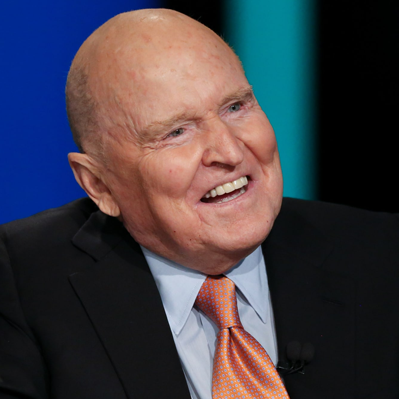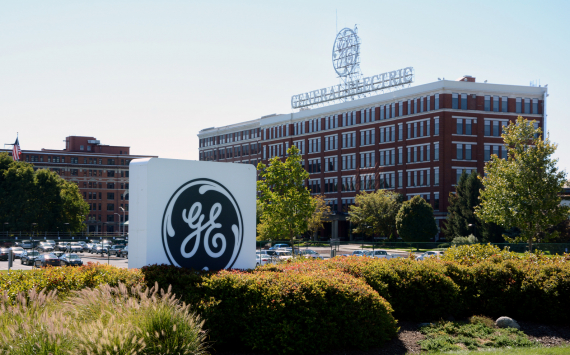- 1. Early life and education
- 2. General Electric
- 2.1. CEO

WELCH
John
Former Chief executive officer of General Electric
Organization: General Electric
Date of Birth: 19 November 1935
person_view.holiday: Entrepreneur's Day
Date death: 1 March 2020
Age at the time of death: 84 years old
Zodiac sign: Scorpio
Profession: Former Chief Executive Officer
Biography
John Francis Welch Jr. was an American business executive, chemical engineer, and writer. He was Chairman and CEO of General Electric (GE) between 1981 and 2001. When he retired from GE he received a severance payment of $417 million, the largest such payment in business history. In 2006, Welch's net worth was estimated at $720 million.
Early life and education
Jack Welch was born in Peabody, Massachusetts, the only child of Grace (Andrews), a homemaker, and John Francis Welch, Sr, a Boston & Maine Railroad conductor. Welch was Irish American and Catholic. His paternal and maternal grandparents were both Irish.
Throughout his early life in middle school and high school, Welch found work in the summers as a golf caddie, newspaper delivery boy, shoe salesman, and drill press operator. Welch attended Salem High School, where he participated in baseball, football, and captained the hockey team.
Late in his senior year, Welch was accepted to University of Massachusetts Amherst, where he studied chemical engineering. Welch worked in chemical engineering at Sunoco and PPG Industries during his college summers. In his sophomore year, he became a member of the Phi Sigma Kappa fraternity. Welch graduated in 1957 with a Bachelor of Science degree in chemical engineering, turning down offers from several companies in order to attend graduate school at the University of Illinois at Urbana-Champaign. He graduated from the University of Illinois, in 1960, with a master's and a PhD in chemical engineering.
General Electric
Welch joined General Electric in 1960. He worked as a junior chemical engineer in Pittsfield, Massachusetts, at a salary of $10,500, which would be equivalent to approximately $90,000 in 2018 dollars. In 1961, Welch planned to quit his job as junior engineer because he was dissatisfied with the raise offered to him and was unhappy with the bureaucracy he observed at GE. Welch was persuaded to remain at GE by Reuben Gutoff, an executive at the company, who promised him that he would help create the small-company atmosphere Welch desired. In 1963, an explosion at the factory which was under his management blew off the roof of the facilities, and he was almost fired for that episode.
By 1968, Welch became the vice president and head of GE's plastics division, which at the time was a $26 million operation for GE. Welch oversaw production as well as the marketing for the GE-developed plastics Lexan and Noryl. Not long after, in 1971, Welch also became the vice president of GE's metallurgical and chemical divisions. By 1973, Welch was named the head of strategic planning for GE and he held that position until 1979, which involved him now working from the corporate headquarters, exposing him to many of the "big fish" he would one day be among. In 1977 Welch was named senior vice president and head of Consumer Products and Services Division, a position he held until 1979 when he became the vice chairman of GE.
In 1981, Welch became GE's youngest chairman and CEO, succeeding Reginald H. Jones. By 1982, Welch had dismantled much of the earlier management put together by Jones with aggressive simplification and consolidation. One of his primary leadership directives was that GE had to be No. 1 or No. 2 in the industries it participated in.
CEO
Through the 1980s, Welch sought to streamline GE. In 1981, he made a speech in New York City called "Growing fast in a slow-growth economy". Under Welch's leadership, GE increased market value from $12 billion in 1981 to $410 billion when he retired, making 600 acquisitions while shifting into emerging markets. Welch pioneered a policy of informality at the work place, allowing all employees to have a small business experience at a large corporation. Welch worked to eradicate perceived inefficiency by trimming inventories and dismantling the bureaucracy that had almost led him to leave GE in the past. He closed factories, reduced payrolls and cut lackluster units.
Welch valued surprise and made unexpected visits to GE's plants and offices. Welch popularized so-called "rank and yank" policies used now by other corporate entities. Each year, Welch would fire the bottom 10% of his managers, regardless of absolute performance. He earned a reputation for brutal candor. He rewarded those in the top 20% with bonuses and employee stock options. He also broadened the stock options program at GE, extending availability from top executives to nearly one third of all employees. Welch is also known for abolishing the nine-layer management hierarchy and bringing a sense of informality to the company.
During the early 1980s he was dubbed "Neutron Jack" (in reference to the neutron bomb) for eliminating employees while leaving buildings intact. In Jack: Straight From The Gut, Welch stated GE had 411,000 employees at the end of 1980, and 299,000 at the end of 1985. Of the 112,000 who left the payroll, 37,000 were in businesses which GE sold off, and 81,000 were reduced in continuing businesses. In return, GE had tremendously increased its market capitalization. Welch reduced basic research, and closed or sold off under-performing businesses.
In 1986, GE acquired RCA.[19] RCA's corporate headquarters were located in Rockefeller Center; Welch subsequently took up an office in the now GE Building at 30 Rockefeller Plaza. The RCA acquisition resulted in GE selling off RCA properties to other companies and keeping NBC as part of the GE portfolio of businesses. During the 1990s, Welch shifted GE's business from manufacturing to financial services through numerous acquisitions.
Welch adopted Motorola's Six Sigma quality program in late 1995. In 1980, the year before Welch became CEO, GE recorded revenues of roughly $26.8 billion and in 2000, the year before he left, they were nearly $130 billion. By 1999 he was named "Manager of the Century" by Fortune magazine.
Embedding succession planning and employee development is important since the departures of management can have significant consequences on an organization. This decision will have paramount effects on future activities. Welch was passionate in making people GE's core competency. There was a lengthy and publicized succession planning saga prior to his retirement among James McNerney, Robert Nardelli, and Jeff Immelt, with Immelt eventually selected to succeed Welch as chairman and CEO. His successor plan had always been a priority, as noted in his 1991 speech "From now on, is the most important decision I'll make. It occupies a considerable amount of thought almost every day."
Welch's "walk-away" package from GE was not valued at the time of his retirement, but GMI Ratings estimates its worth at $420 million.
He served as Chairman of The Business Council in 1991 and 1992.
Mentions in the news
Born in one day
person_view.holiday: Entrepreneur's Day
(Pig) .
Horoscope Scorpio: horoscope for today, horoscope for tomorrow, horoscope for week, horoscope for month, horoscope for year.











































